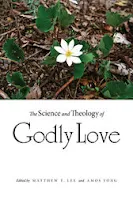 The
Science and
The
Science andTheology of Godly Love
By
Matthew Lee
& Amos Yong
Reviewed by
Geoffrey W. Sutton
The interest in godly love has been inspired by social scientists affiliated with the Institute for Research on Unlimited love. These scientists and affiliated colleagues trace at least part of their heritage to work on altruism by former Harvard University sociologist, Pitirim Sorokin.
The Science and Theology of Godly Love includes an Introduction by Lee, Poloma, and Post followed by ten chapters. The first five chapters were written by theologians. Each presents challenges to dimensions of godly love. Stephen Post discusses universality; Michael McClymond explores mutuality and self-sacrifice; Peter Althouse proposes the importance of a Christological focus to understanding godly love; Paul Alexander critiques theologies that support violence and asserts that understanding godly love entails an active nonviolence. Finally, Thomas Oord offers two contributions: Considerations in measuring love and assessing God’s etiological role in human love.
Part two contains five chapters by behavioral scientists. Hood considers alternatives to methodological atheism in the study of godly love. Exline suggests potential methods from psychology, including a role for experimental methods. Poloma reviews a sociological perspective with examples from her research among Pentecostals. Mark Carledge uses a study on glossolalia to illustrate how theologians and social scientists may collaborate. Arlene Sanchez Walsh demonstrates how case studies may contribute to an understanding of godly love. Amos Yong concludes the discussion and offers an emphasis on assessing distinctive links between the manifestation of the Holy Spirit in love among Pentecostals compared to non-Pentecostals.
The diversity of perspectives integrates theology and science like hikers ascending a mountain from different paths, which offer unique challenges but eventually lead to an appreciation of the same phenomena, godly love.
Related Book: Forgiveness Reconciliation and Restoration
Available on AMAZON and from the publisher Pickwick/ WipfandStock

Comments
Post a Comment